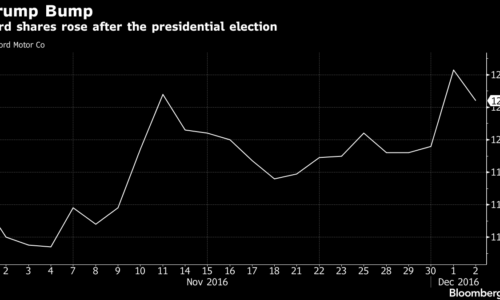Ford Motor Co. was a target of Donald Trump’s criticism on the campaign trail for building cars in Mexico, and now that Trump will be president, Ford said it’s willing to work with him to keep jobs in the U.S. — provided Trump puts the right policies in place, according to the automaker’s chief executive officer.
“We will be very clear in the things we’d like to see,” Mark Fields said in an exclusive interview Friday at Bloomberg offices in Southfield, Michigan.
Among them, according to Fields: currency-manipulation rules to promote free and fair trade, tax reform and safety guidelines for autonomous vehicles.
Fields said that Ford plans to lobby the new president to soften U.S. and state fuel-economy rules. They hurt profits by forcing automakers to build more electric cars and hybrids than are warranted by customer demand, he said.
“In 2008, there were 12 electrified vehicles offered in the U.S. market and it represented 2.3 percent of the industry,” Fields said in the interview. “Fast forward to 2016, there’s 55 models, and year to date it’s 2.8 percent.”
No Market
This isn’t exactly a formula for success, he said. “At the end of the day, you’ve got to have customers, so obviously, there would be pressure on the business if there’s not a market,” he said.
The No. 2 U.S. carmaker was one of the companies Trump singled out on the campaign trail for sending production to Mexico. The Republican threatened to slap a 35 percent tariff on cars Ford builds south of the border and ships back to the U.S.

After the Nov. 8 election, Trump phoned Executive Chairman Bill Ford to discuss the carmaker’s plan to move manufacture of the Lincoln MKC sport utility vehicle to Mexico from a plant in Louisville, Kentucky, Fields said. The discussion helped convince Ford to keep building the Lincoln in the U.S.
Trump influenced the decision “because of what he’s talking about in terms of his economic policies, whether it’s tax reform or otherwise,” Fields said.
Ford received no incentives for keeping Lincoln MKC production in Kentucky, but the automaker never planned to close that Louisville plant, which also builds the Escape SUV that outsells the Lincoln version by 12-to-1. Ford already makes the Lincoln MKZ sedan and the Fusion family car in Mexico. It’s building a $1.6 billion new small-car factory in the Mexican state of San Luis Potosi, which will create 2,800 jobs there by 2020.
Ford still plans to move its Focus compact and C-Max hybrid to Mexico from a Michigan factory.
Carrier Deal
Trump also criticized the Carrier unit of United Technologies Corp. after the company said it would move production to Mexico, cutting 1,400 jobs in Indiana. Trump and Carrier unveiled a deal Thursday in which the maker of furnaces and air-conditioners will get $7 million in state incentives to keep the work in Indiana. Despite the agreement, about 1,100 Carrier employees in the Indianapolis area will lose their jobs.
Fields said the automaker’s situation is different than Carrier’s. The small cars Ford is moving out of the Michigan factory are being replaced by two other models “and not one job is being displaced,” Fields said.
“Our position is very different than the Carrier position,” Fields said. He added that he didn’t know whether Trump would carry through with his campaign pledge to impose the tariff on Ford’s Mexican-built cars, but he said he doubted it would be applied to just one company.
“It would be imposed on the entire industry, not just singling out a single company,” Fields said. “When you look at the production and supply chains and how they’re integrated between the three countries” — Mexico, Canada and the U.S. — “putting a tariff on that would have a negative impact on all the economies.”
Mexico Investments
Since 2010, nine global automakers, including General Motors Co., Ford and Fiat Chrysler Automobiles NV, have announced investments of more than $24 billion in Mexico, where wages are 80 percent lower than in the U.S. Annual auto output in Mexico may more than double this decade, from 2 million to 5 million vehicles, according to the Center for Automotive Research in Ann Arbor, Michigan.
Ford has said it’s just the fifth-largest producer of vehicles in Mexico while it’s the top automotive manufacturer in the U.S. The company said it’s added nearly 28,000 jobs in the U.S. over the last five years. Ford employs 85,000 workers in the U.S. and 8,800 in Mexico.
The day after the election, General Motors announced it would end the third shift at assembly plants in Ohio and Michigan in January. The automaker is closing the plants, eliminating almost 2,100 jobs, because consumers prefer trucks and sport utility vehicles over the small cars built at the two factories.
Trump Dialog
Trump Dialog
Fields said Ford would now continue its dialog with Trump. The auto industry may seek clean-air credits for self-driving cars, which could reduce fuel consumption and emissions by helping traffic move more smoothly.
Despite the regulatory uncertainty, Fields said Ford has made no change in its plan to invest an additional $4.5 billion in electrified vehicles by 2020, and to install this technology in 40 percent of its nameplates.
Ford wants to continue to help boost fuel economy and lessen the industry’s environmental impact, because the company acknowledges climate change as a serious threat, Fields said.
The automaker has cut profit forecasts twice in the last three months. In September, Ford reduced its 2016 profit prediction by $600 million, to $10.2 billion from at least $10.8 billion, due to rising recall costs. Last month, it trimmed the 2017 profit outlook for its credit unit by $300 million, to $1.5 billion, because declining auction values for used cars would hurt results.
Ford shares have gained 6.6 percent since Trump’s election.


No comments:
Post a Comment